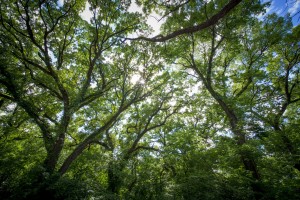In Zechariah 3:8-10 Zechariah prophesied of the Heavenly High Priest who will reign over all. During this reign the Lord informs them that every man shall call “his neighbour under the vine and under the fig tree (10).” In several places in the Old Testament, this phrase, “under his vine and under his fig tree” is used to denote a place of privilege bringing both safety and peace (1 Kings 4:25, 2 Kings 18:31, Micah 4:4, Joel 2:22). When the fig is mentioned in context of Israel it is a symbol of their national and governmental privilege and the vine represents their spiritual privileges.
Zechariah prophesied of the Heavenly High Priest who will reign over all. During this reign the Lord informs them that every man shall call “his neighbour under the vine and under the fig tree (10).” In several places in the Old Testament, this phrase, “under his vine and under his fig tree” is used to denote a place of privilege bringing both safety and peace (1 Kings 4:25, 2 Kings 18:31, Micah 4:4, Joel 2:22). When the fig is mentioned in context of Israel it is a symbol of their national and governmental privilege and the vine represents their spiritual privileges.
In the New Testament Christ makes reference to the fig tree. The “fig-tree” is a fit emblem of Israel. “Its peculiarity is that the blossoms of the fruit appear before the leaves. Naturally, therefore, we should look for fruit on a tree in full leaf. This accounts for why Jesus cursed the fig-tree that had on it nothing but leaves (Matt. 21:18-20). The application of this incident to Israel is simple. Naturally Jesus from their “leafy profession” would expect to find fruit on the tree of their national life, and when He found none He cursed them for their HYPOCRISY (Matt. 23:1-33).” https://www.blueletterbible.org/study/larkin/dt/29.cfm
We can apply this to our lives by comparing Christ’s teaching in John 15. Here, Christ shows the significance of the fruit bearing process for believers. Scofield makes reference to this in his study Bible. He informs us there are “Three degrees in fruit-bearing: “Fruit,” John 15:2, “more fruit,” John 15:2, “much fruit,” John 15:5 John 15:8 . As we bear “much fruit” the Father is glorified in us. The minor moralities and graces of Christianity are often imitated, but never the ninefold “fruit” of Galatians 5:22 Galatians 5:23 . Where such fruit is the Father glorified. The Pharisees were moral and intensely “religious,” but not one of them could say with Christ, “I have glorified thee on the earth” John 17:4 .” When others look at us do they see leaves, fruit, more fruit, or much fruit?
You must be logged in to post a comment.